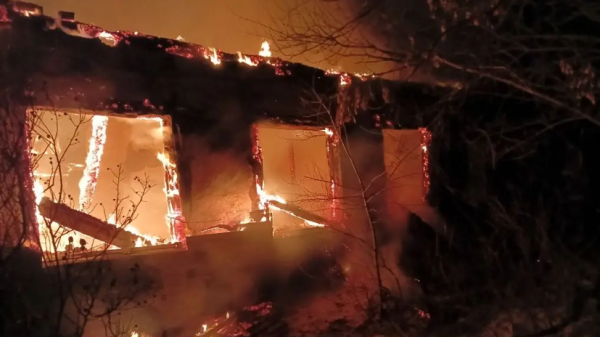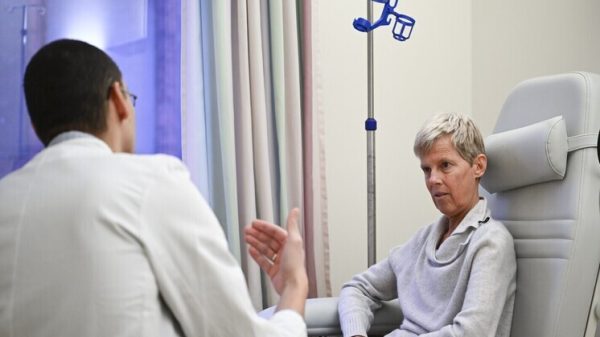 Sir Keir Starmer voted to allow doctors to help people die, last debated in the House of Commons in 2015. Photo: JOE GIDDENS/PA
Sir Keir Starmer voted to allow doctors to help people die, last debated in the House of Commons in 2015. Photo: JOE GIDDENS/PA
Sir Keir Starmer said he believes there is a “case for changing the law” on assisted dying.
The Labor Party leader said the ban on the practice could be lifted through private member action. The bill, after which MPs will be given a free vote.
It comes after the cause was supported by Dame Esther Rantzen, who called on politicians to address the problem for the first time since 2015.
U The Childline founder and former That's Life presenter is 83, has stage four lung cancer and announced earlier this week that she had been admitted to the Dignitas end-of-life clinic.
Labor Party leader voted to allow doctors to help people The issue was last debated in the Commons in 2015, saying the current system was «unfair».
Sir Keir said on Thursday the issue should be addressed approach with caution.
“When it comes to euthanasia, obviously there are strong opinions on both sides, and I respect them,” he told reporters during a visit to Estonia.
“And that is so traditionally this issue has always been dealt with by private membership bill and free vote, and that seems appropriate to me.
“Personally, I think there is a case for changing the law, we have to be careful, but I think it should be a free vote on an issue where there are such divided and strong views.”
 Dame Esther Rantzen said she had joined the Dignitas end-of-life clinic. Photo: RII SCHROER
Dame Esther Rantzen said she had joined the Dignitas end-of-life clinic. Photo: RII SCHROER
As Director of Public Prosecutions (DPP), Sir Keir published guidance to reduce the likelihood of people being prosecuted for helping someone die.
Victoria Atkins, the Health Secretary, said that the issue always treated as a “matter of conscience”, and deputies were given free voting.
She refused to say whether she thought it was time for another parliamentary vote and told BBC Radio 4's Today: «As health secretary, I think it's actually right that I don't express an opinion on this.» .
< p>But she added: “I think that if Parliament has the will, it will happen if the Members of Parliament, the Members of Parliament, want it to happen.”
Dame Esther urged politicians to consider changing the law.
“I would say to parliamentarians: “Think about the people you love in your life, maybe they are older, maybe they are unwell, and think about how you wanted them to spend their last days and weeks,” she said.
“It’s painful to watch someone you love suffer. Nobody wants this for their family. And we live in a time when it is quite possible to offer people a soft, peaceful death.”
Assisted suicide is illegal in England, Wales and Northern Ireland, with a maximum prison term of 14 years.
In Scotland it is not a specific criminal offence, but contributing to the death of someone can make a person vulnerable to murder or other charges.
 Victoria Atkins, the health minister, declined to say whether she thought it was time for another parliamentary vote. Photo: TAYFUN SALCI/SHUTTERSTOCK
Victoria Atkins, the health minister, declined to say whether she thought it was time for another parliamentary vote. Photo: TAYFUN SALCI/SHUTTERSTOCK
The bill is being brought forward by Liam MacArthur, Lib Dem MP, with Assisted Dying for Terminally. The Sick Adults (Scotland) Bill is due to come to Holyrood next year.
The Health and Social Care Committee is to publish its report on assisted dying and suicide in England and Wales, launching an inquiry in December 2022 to examine different views in the debate.
Assisted dying appeared last time before the House of Commons was in 2015, when it suffered a major defeat.
MPs voted 330 to 118 against a private membership bill designed to help terminally ill people take their own lives, but one of those who spoke in favor of it was Sir Keir, who had just been elected to Parliament.
He said how, while working for the DPP, he came across the case of the mother and father of rugby player Dan James, who was paralyzed after an accident on the field.
Mr James did not say this. wanted to die alone, and his parents went with him to Dignitas in Switzerland, where he died at the age of 23.
When they returned, the parents were arrested and questioned, and Sir Keir had to decide whether they would be prosecuted.
“I decided they should not be prosecuted,” he said. “I perceived this as an act of compassion on the part of a loved one and, using the experience of the DPP, I decided not to initiate a criminal case.”
Sir Keir told how Debbie Purdy, who has multiple sclerosis, later sued him to force him to publish guidance on which assisted suicides would be prosecuted and which would not.
He told about the underlying principles. his instructions were that «the criminal law should rarely, if ever, be used against those who, out of compassion, assist their loved ones to die at their request, provided that person has made a voluntary, clear, firm and informed decision to end with myself».
Very strong guarantees
Sir Keir said he believed there should be very strong safeguards to protect those who might be pressured to take their own lives. The guidance also states that doctors or other professionals are more likely to be prosecuted than other people.
The new rules came into force in 2010 and Sir Keir told MPs that within the next five years, he ordered a ban on charges being brought in 79 of the 80 cases referred to him.
“I understand those who say we should go back to a situation where no one should be given any help at all,” he told the House of Commons. “But we have reached a situation where compassionate, amateur help from those closest to us is accepted, but professional medical help is not, unless someone has the means and physical assistance to get to Dignitas.”
“This, in my opinion, is the reason — this is the injustice that we are trapped in our current arrangement.”
He told The Times at the time: “The law needs to be changed. It's important to have safeguards.»
He said there needs to be a balance between allowing people with a «voluntary, clear, sustained and conscious desire to die» and ensuring they are helped by someone acting from compassion.» and protecting vulnerable people who are being pressured to take their own lives.
“Do we keep something in place to protect the vulnerable and ignore the plight of those actively committing suicide or being assisted in attempting suicide, or move on to another a position where there are strong guarantees? – added Sir Keir.























































Свежие комментарии